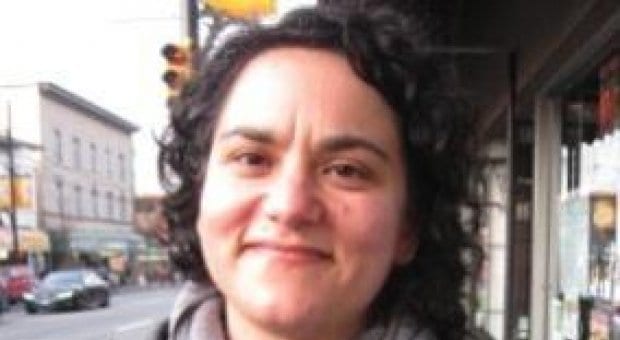The Vancouver chapter of Queers Against Israeli Apartheid (QuAIA) is once again planning to lobby the Vancouver Queer Film Festival to boycott any film endorsed by the Israeli government.
Last year, QuAIA members donned masks shaped like the festival’s hedgehog mascot and protested the inclusion of several films endorsed by the Israeli consulate.
QuAIA is concerned that such films promote “pinkwashing” by holding up positive stories of queer lives in Israel to obscure the country’s alleged human rights violations against others, particularly Palestinians.
Vancouver Queer Film Festival organizers invited QuAIA to present a letter outlining its concerns at a panel discussion last August but did not offer to change its policy on screening Israeli films.
Shana Myara, the festival’s new programming director, says she has no plans to adopt QuAIA’s proposed resolution to boycott Israeli films, as part of the broader boycott, divest and sanction (BDS) movement.
“We definitely have had conversations and we continue to come back to our mandate, which is to share queer stories and celebrate queer lives,” she says. “We tend to look at each film for its individual merits.”
Myara says she’s open to making contact with the group and appreciates its perspective.
“They’re putting forward some excellent points and excellent discussion,” she says. “Our role here is to make sure that everyone in the community can come forward to discuss ideas together at the festival.”
Members of QuAIA have previously stated that they feel the refusal to boycott films endorsed by the Israeli government excludes Palestinian queers from those discussions.
Myara says she doesn’t feel comfortable speaking to the issue. “Again, we really strive for diversity in our programming. It’s one of the cornerstones of our programming.”
At a panel discussion held May 2, QuAIA members appealed to a crowd of several dozen queers and allies to send letters to the festival’s organizing committee in the leadup to July, when the list of films to be included will be announced.
The focus of the meeting, held at the Harbour Centre downtown, was to discuss the practice of pinkwashing, both locally and on a global scale, and to call for support in asking the Vancouver Queer Film Festival to change its selection process.
One of the panel speakers was Nada Elia, a Palestinian academic who now lives in Seattle. She said the origin of the term pinkwashing has nothing to do with queers.
The word was originally used to describe the phenomenon of using a pink ribbon to represent the fight against breast cancer, she said. Consumers would pay a small premium on products labelled with the symbol with the understanding that the extra money would go toward supporting breast cancer research. In reality, there are regulations governing who can and can’t put the ribbon on their products and what they can do with the extra money. “It was just an exploitation of people’s good feeling, good desire to help.”
The word is now being applied to Israel’s desire to promote aspects of culture, such as film, that promote queer acceptance. “For the longest time, Israel was viewed as the victim in the first world, in the Western world,” Elia said. “Israel was the country that came out of the ashes of the Holocaust.”
But, she said, this attitude obscured Israel’s abuse of Palestinians, including queer Palestinians.
She used her own identity as a queer Palestinian without the right of return to make her point. “I can’t show up at the airport and say, ‘I’m a lesbian, let me in.'”
One of the major critiques of calls for a cultural boycott of Israel is that it punishes queer Israelis, preventing them from celebrating hard-won gains in human rights and equality. But Elia is quick to emphasize the difference between a boycott of all Israeli culture and a boycott only of those products endorsed by the Israeli government or the Israeli consulate.
“It’s not that anything Israeli is subject to boycott as far as cultural products,” she said. The BDS resolutions QuAIA organizations across North America are calling for refer only to activities associated with the Brand Israel campaign, she said. “There are pretty clear guidelines for boycott.”
Mike Krebs, who is of Blackfoot Cree and European descent, suggested a similar phenomenon of redwashing: the paralleling of the experiences of indigenous peoples in Canada with the experience of Zionist Jews. In reality, Krebs said, the most striking parallel is between the Israeli and the Canadian governments, both of which he classifies as settler colonial regimes.
Naomi Linklater, an attendee of Cree and European descent, told the crowd that she had experienced redwashing firsthand in the course of her work with the Dialogues Project. The organization works to build understanding between First Nations populations and newcomers to Canada. A recent meeting was held in a synagogue, a fact Linklater said wasn’t problematic in itself, and a large part of the discussion focused on drawing comparisons between First Nations people and Jewish people, calling both indigenous.
“We probably had a good 45-minute lecture on the similarities between Israelis and the indigenous population and the parallels in our communities, which was really, really difficult to accept,” she said, adding that she was disturbed to see First Nations leaders taking up the narrative.
QuAIA organizers declined to be interviewed for this article.

 Why you can trust Xtra
Why you can trust Xtra


